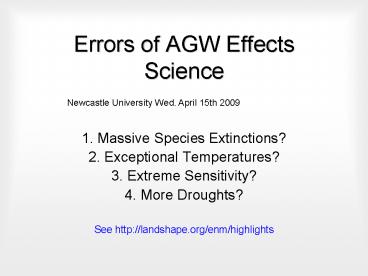Errors of AGW Effects Science - PowerPoint PPT Presentation
1 / 12
Title:
Errors of AGW Effects Science
Description:
Chris Thomas et al. 2004. Range Size. Extinction Risk ' ... rank-sum test (wilcox.test(x,y) in R) shows significant differences between periods. ... – PowerPoint PPT presentation
Number of Views:58
Avg rating:3.0/5.0
Title: Errors of AGW Effects Science
1
Errors of AGW Effects Science
Newcastle University Wed. April 15th 2009
- 1. Massive Species Extinctions?
- 2. Exceptional Temperatures?
- 3. Extreme Sensitivity?
- 4. More Droughts?
- See http//landshape.org/enm/highlights
2
David R.B. Stockwell
- PhD Ecosystem Dynamics Australian National
University - Stats Consultant to NPWS, LWRRDC, PWS 5 years
- Assistant Research Scientist University of
California San Diego 10 yrs - 1000 citations (Google Scholar)
- 1 book, 30 peer-reviewed papers
- Panelist for NASA, NSF, AAAS, Presidential Com.
3
Massive Species Extinctions from Warming or Bias?
we predict, on the basis of mid-range
climate-warming scenarios for 2050, that 1537
of species in our sample of regions and taxa will
be committed to extinction. - Chris Thomas et
al. 2004.
Extinction Risk
Range Size
4
Thus, global estimates of extinctions due to
climate change (Thomas et al. 2004) may have
greatly overestimated the probability of
extinction as a result of the inherent
variability in niche modeling (e.g., Thuiller et
al. 2004). It is a problem when a paper reports
on minor uncertainties and does not describe
major uncertainties. - Bodkin et al. (19 authors
including DRBS) 2007
5
Exceptional Temperatures or artifact?
McIntyre and McKitricks claim that the common
procedure (6) of screening proxy data (used in
some of our reconstructions) generates hockey
sticks is unsupported in peer-reviewed
literature. - Michael Mann 2009
6
Random series produce hockey sticks (AIG DRBS
2006)
However, their finding that the spatial extent
of 20th-century warming is exceptional ignores
the effect of proxy screening on the
corresponding significance levels. After
appropriate correction, the significance of the
20th-century warming anomaly disappears. - Gerd
Bürger, Science 29 June 2007.
7
Extreme Sensitivity?
The data available for the period since 1990
raise concerns that the climate system, in
particular sea level, may be responding more
quickly to climate change than our current
generation of models indicates.
8
Recent climate observations disagree with
Rahmstorf et al. (2007) that climate models
underestimate sensitivity (DRBS 2009 submitted).
9
Will DroughtsIncrease?
Under the high scenario, EC declarations would
likely be triggered about twice as often and over
twice the area in all regions. In SWWA the
frequency and areas covered would likely be even
greater. - Hennessy et al.
10
Droughts have significantly decreased but
modeled droughts significantly increase. DRBS
Observed droughts (regions)
Observed droughts (Australia) Modeled
droughts (regions)
11
Models Useless
- Table 1 Mean percentage area of exceptionally
low rainfall over time periods a Mann Whitney
rank-sum test (wilcox.test(x,y) in R) shows
significant differences between periods. - 1900-1967 1951-2007 P
- ObsAreaDrought 6.20.7 4.90.6 0.004
- ModelAreaDrought 4.80.2 6.20.2 lt0.001
12
Uncertainty The observations dont statistically
support the claim. Eg. Rahmstorf et
al.Circularity The alternative result not
possible. Eg. Mann et al., Thomas et
al.Unvalidated The model does not adequately
perform its intended use. Eg. Hennessy et
al.Many claims of AGW effects contain these
basic errors.Do these errors matter?Representat
ions, Burden of Proof, Warranties, Bias,
Robustness, Statistical Significance See
http//landshape.org/enm/highlights
Errors































